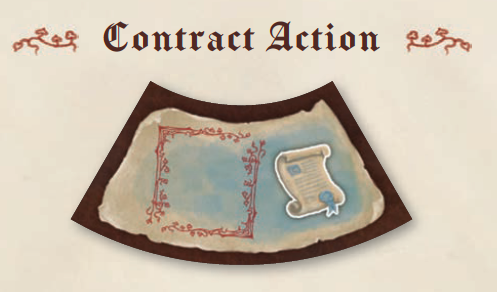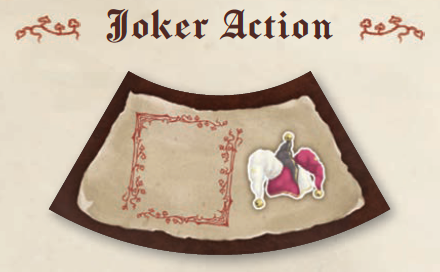At its core, Tiletum is a dice management action point selection game. This game expands the Board & Dice “T-Games” series (previous entries include Teotihuacan, Tekhenu, Tabannusi, and Tawantisuyu) with expert gamers as the target audience. In 12 turns, players gather resources and travel around the maps to build houses, gain favors from nobles, invest in cathedral constructions, fulfill Contracts and participate in city fairs. It is imparative to take advantage of bonus actions outside of one’s normal actions by means of Helper tiles, Character abilities and/or Player board unlockables.
All resources are not created equal - Players choose three dice each round in order to gain resources and take actions. There are five types of resources in Tiletum: food, stone, iron, wool and gold. The first four resources are used as currencies to pay for cost of Crest placement (food), investing in cathedral constructions (stone), and Contracts (iron and wool). Gold can be spent to alter dice and purchase any resources at a two to one ratio. After a few plays, we found that gold is highly valuable because it not only gives the player flexibility during the dice drafting phase, but also comes in handy when you are a little short of a particular resource in order to complete a task. Depending what the player is trying to achieve, it is entirely possible to ignore either food, stone, iron, or wool and still do well with; however, be sure to never run out off of gold!
All actions are not created equal - Most of the points in Tiletum would come from participating in the four city fairs during the game, and the Houses x Pillars multiplier and completed Buildings at the end of the game. Based on the fact that Houses allow players to participate in fairs and are scored at the end of the game, prioritizing the Merchant Action at the beginning of the game is a good bet; especially if you are ahead in turn order. This allows one to place Houses at fair cities to participate when it is scored, and obtain helper tiles along the way.
To unlock more Houses, players need to take the Character Action to draft and place Character tiles. Look for tiles that feature bonus actions that can expedite your current plan and fill in the double capacity Buildings asap. Both of these Buildings feature powerful crest placement bonuses that should be used at the right moment during the game. Once that happens, you would have completed the Buildings and unlock the +2 action bonus tile right away. Having many completed Buildings also brings VPs at end game - up to 30 points! Housing spots in Koln, Hamburg, Milano, and Toulouse provide a bonus that let players select one of their Building and receive each Character bonus once in any order. When timed correctly this could be very helpful.
Even if you are unable to get in the Merchant Action because you are behind on turn order, taking the Character Action is still a good way to increase VPs and boost efficiency in later rounds. Plus, since the Character tile market replenishes every turn and there are plenty of crests in the supply, it is not difficult to complete all 6 Buildings as long as the player grab enough food.
Two other ways to gain points in Tiletum are to fulfill Contracts and invest in the construction of monumental cathedrals. Completing these tasks requires the players to gain the right to do the task by obtaining a task tile or placing a Pillar at a particular city then pay the resources to satisfy the requirement. If the Fair tiles that score the Pillars and/or Contracts are in play, then it would be worthwhile to devote several turns to take the Contract/Architect actions in order to maximize potential VPs. If this is not the case, I recommend ignoring Contract Action completely if you are ahead in turn order and prioritize the aforementioned Merchant/Character Actions.
However, if you are behind in turn order and your opponents have already snatched many city bonus tiles ahead of you, then focusing on the Architect Action may not be a bad bet since you gain VPs for investing in Cathedrals and the Pillars do provide significant end game bonuses — as long as you also manage to put out at least 2 Houses before the end of the game to increase to multipliers. This can be achieved by taking a dice to do a regular Merchant action, but the more efficient way to do this is by triggering a free action using helper tiles with Merchant action points, or thru the Crest placement bonuses. If you have at enough Food/Gold and a Crest available, I recommend using the “Pay 6 food. Place a House onto any Town” Crest bonus and build a House in Firenze, Venezia, and Wien since they are worth 7-8 bonus points.
Same can be said about the players who focus on the Merchant action that they also need to put out at least 2 Pillars before the final round. Rather than taking the Architect action to place the pillars, I recommend taking advantage of Helper tiles with Architect action points or triggering the “Pay 6 food. Place a Pillar onto any Town” Crest placement bonuses to accomplish this more efficiently.
Compared to the other four actions, the King action is not especially rewarding unless the Fair tiles that score the King track position are in play that round, or if one covets the first player position. Neglecting the King Track does cause players to lost a few points per round, but compared to the VPs they would gain from other actions this is not a big deal. Under the special circumstances when the 1 pip/6 AP action wheel space lands at King action, this may be the only exception. Since one gets to move their marker up 6 times, it is possible to gain up to 10 VPs a single action and stay ahead on the King track.
The Joker action is great, especially for players with low turn order. The only draw back is players cannot split the APs into multiple actions. This can still be a good choice during those moments when you need a particular resource to accomplish a task you have been building up for.
We have provided a general analysis of the resources and actions in Tiletum. Nevertheless, players must still assess the situation and make tactical decisions based on which four Fair tiles/cities are chosen, their turn order position, and how the dice were rolled each round. What remains constant is that the game has many built-in tools (Gold, Helper tiles, and Crest placement bonuses) that let you “hack” the restrictions. Just make sure you keep track of everything that is available to you before taking any dice.
-Jackie
(About the author - Jacqueline Chao is the executive producer and main content contributor at Show Me How to Win. Follow her board game journey on instagram @boardgamesetc )
Tiletum was designed by Simone Luciani and Daniele Tascini. It is published in 2022 by Board & Dice in the US and our copy was provided by the publisher.









